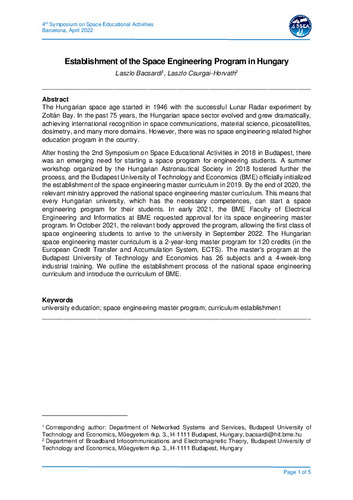Establishment of the Space Engineering Program in Hungary

Visualitza/Obre
10.5821/conference-9788419184405.068
Inclou dades d'ús des de 2022
Cita com:
hdl:2117/370948
Tipus de documentComunicació de congrés
Data publicació2022-04-29
EditorUniversitat Politècnica de Catalunya
Condicions d'accésAccés obert
Llevat que s'hi indiqui el contrari, els
continguts d'aquesta obra estan subjectes a la llicència de Creative Commons
:
Reconeixement-NoComercial-SenseObraDerivada 4.0 Internacional
Abstract
The Hungarian space age started in 1946 with the successful Lunar Radar experiment by Zoltán Bay. In the past 75 years, the Hungarian space sector evolved and grew dramatically, achieving international recognition in space communications, material science, picosatellites, dosimetry, and many more domains. However, there was no space engineering related higher education program in the country. After hosting the 2nd Symposium on Space Educational Activities in 2018 in Budapest, there was an emerging need for starting a space program for engineering students. A summer workshop organized by the Hungarian Astronautical Society in 2018 fostered further the process, and the Budapest University of Technology and Economics (BME) officially initialized the establishment of the space engineering master curriculum in 2019. By the end of 2020, the relevant ministry approved the national space engineering master curriculum. This means that every Hungarian university, which has the necessary competences, can start a space engineering program for their students. In early 2021, the BME Faculty of Electrical Engineering and Informatics at BME requested approval for its space engineering master program. In October 2021, the relevant body approved the program, allowing the first class of space engineering students to arrive to the university in September 2022. The Hungarian space engineering master curriculum is a 2-year-long master program for 120 credits (in the European Credit Transfer and Accumulation System, ECTS). The master's program at the Budapest University of Technology and Economics has 26 subjects and a 4-week-long industrial training. We outline the establishment process of the national space engineering curriculum and introduce the curriculum of BME
CitacióBacsardi, L.; Csurgai Horvath, L. Establishment of the Space Engineering Program in Hungary. A: "4th Symposium on Space Educational Activities". Universitat Politècnica de Catalunya, 2022,
ISBN9788419184405
| Fitxers | Descripció | Mida | Format | Visualitza |
|---|---|---|---|---|
| SSEA_2022_156.pdf | 423,5Kb | Visualitza/Obre |


